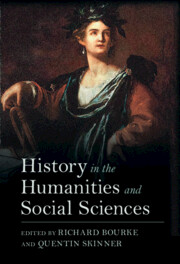Book contents
- History in the Humanities and Social Sciences
- History in the Humanities and Social Sciences
- Copyright page
- Contents
- Figures
- Contributors
- Acknowledgements
- Introduction
- 1 Law and History, History and Law
- 2 History, Law and the Rediscovery of Social Theory
- 3 The Uses of History in the Study of International Politics
- 4 International Relations Theory and Modern International Order: The Case of Refugees
- 5 The Delphi Syndrome: Using History in the Social Sciences
- 6 Power in Narrative and Narratives of Power in Historical Sociology
- 7 History and Normativity in Political Theory: The Case of Rawls
- 8 Political Philosophy and the Uses of History
- 9 The Relationship between Philosophy and its History
- 10 When Reason Does Not See You: Feminism at the Intersection of History and Philosophy
- 11 On (Lost and Found) Analytical History in Political Science
- 12 Making History: Poetry and Prosopopoeia
- 13 Reloading the British Romantic Canon: The Historical Editing of Literary Texts
- 14 Economics and History: Analysing Serfdom
- 15 The Return of Depression Economics: Paul Krugman and the Twenty-First-Century Crisis of American Democracy
- 16 Anthropology and the Turn to History
- Index
- References
15 - The Return of Depression Economics: Paul Krugman and the Twenty-First-Century Crisis of American Democracy
Published online by Cambridge University Press: 08 December 2022
- History in the Humanities and Social Sciences
- History in the Humanities and Social Sciences
- Copyright page
- Contents
- Figures
- Contributors
- Acknowledgements
- Introduction
- 1 Law and History, History and Law
- 2 History, Law and the Rediscovery of Social Theory
- 3 The Uses of History in the Study of International Politics
- 4 International Relations Theory and Modern International Order: The Case of Refugees
- 5 The Delphi Syndrome: Using History in the Social Sciences
- 6 Power in Narrative and Narratives of Power in Historical Sociology
- 7 History and Normativity in Political Theory: The Case of Rawls
- 8 Political Philosophy and the Uses of History
- 9 The Relationship between Philosophy and its History
- 10 When Reason Does Not See You: Feminism at the Intersection of History and Philosophy
- 11 On (Lost and Found) Analytical History in Political Science
- 12 Making History: Poetry and Prosopopoeia
- 13 Reloading the British Romantic Canon: The Historical Editing of Literary Texts
- 14 Economics and History: Analysing Serfdom
- 15 The Return of Depression Economics: Paul Krugman and the Twenty-First-Century Crisis of American Democracy
- 16 Anthropology and the Turn to History
- Index
- References
Summary
Paul Krugman is one of the most influential commentators in twenty-first-century America. His authority rests on his status as a Nobel prize-winning economist, but his appeal to millions of American readers derives from his ability to narrate the crises of contemporary American liberalism as dramatic history. By his own account Krugman as a young person was fascinated by the idea of a total social science inspired by the science fiction of Isaac Asimov. As he discovered as a College student in the early 1970s that synthesis of historical and social knowledge does not exist. Krugman became an economist out of disappointment with history. That disappointment was both intellectual – history’s failure to provide succinct causal explanations - and political – history’s tendency towards overdetermined fatalism as opposed to pragmatic simplification. It might be said that in his writings as a public intellectual Krugman has been reaching for the overview that eluded him as a young man. Economics, politics and history mingle freely in his work. This, however, has not led to a stable synthesis. As Krugman has become more deeply engaged in politics, it is the framing assumptions of his economics, the neoclassical synthesis forged at MIT after World War II, that have been put in question.
- Type
- Chapter
- Information
- History in the Humanities and Social Sciences , pp. 354 - 378Publisher: Cambridge University PressPrint publication year: 2022



